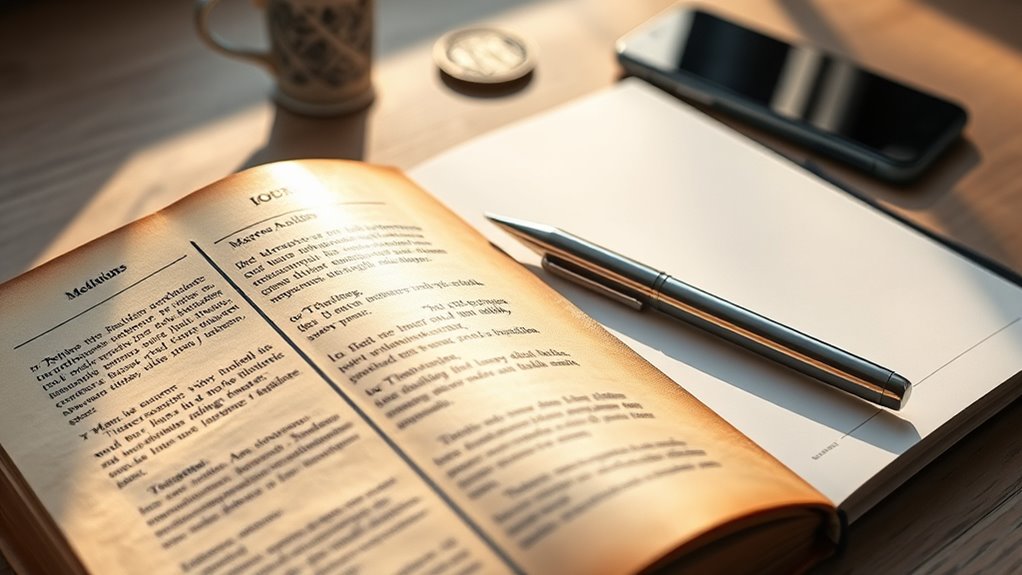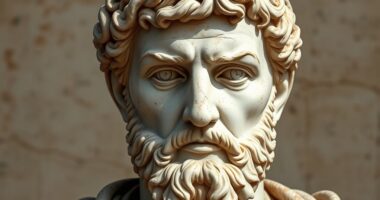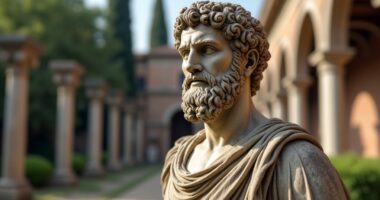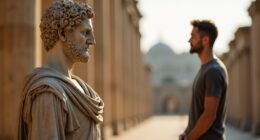The meditations of Marcus Aurelius and modern journals both focus on self-awareness, virtue, and resilience. Aurelius used his writings to examine his morals, control passions, and accept adversity—similar to how you might journal to process emotions and set intentions. While his work was private and philosophical, today’s journals often incorporate diverse tools like mood tracking and mindfulness. If you keep exploring, you’ll uncover how timeless reflection techniques still shape personal growth today.
Key Takeaways
- Both emphasize self-awareness, discipline, and reflection to cultivate virtue and personal growth.
- Marcus Aurelius’ Meditations focus on moral questions, acceptance, and aligning with nature, similar to modern journaling’s introspection.
- Modern journals incorporate diverse techniques like mood tracking and digital tools, expanding on Aurelius’ meditative practices.
- Aurelius’ writings are private reflections aimed at self-improvement, akin to personal journaling for inner development.
- Both serve as tools for processing adversity, reinforcing values, and fostering resilience through consistent self-examination.
The Origins and Contexts of Personal Reflection
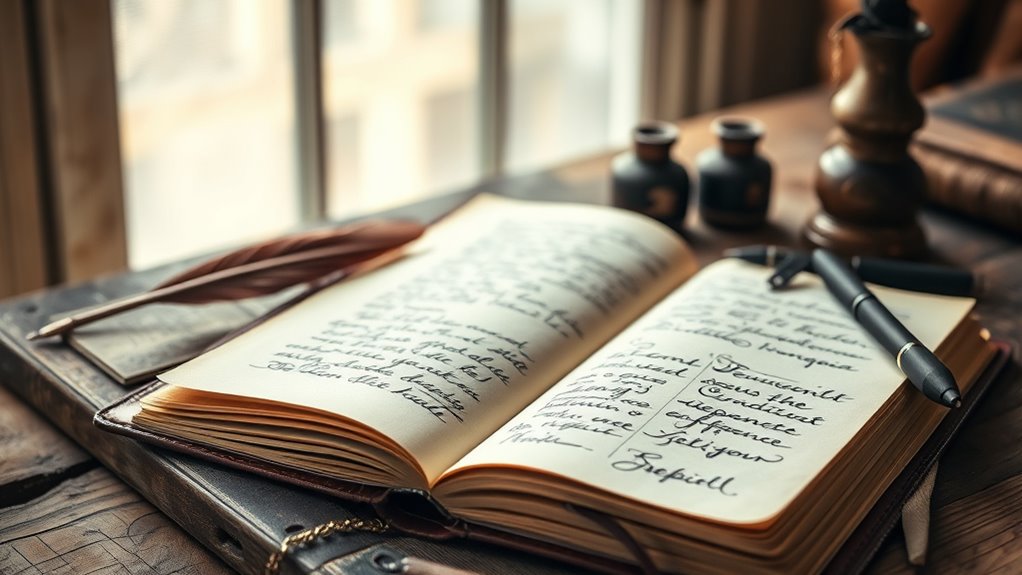
Personal reflection has deep roots that stretch back thousands of years, serving as a way for individuals to understand themselves and their place in the world. Ancient philosophers like Marcus Aurelius used journaling to process their thoughts, grapple with moral questions, and seek inner calm amid chaos. These early practices weren’t just about recording events; they were tools for self-examination and growth. The practice of meditative journaling has persisted through history, emphasizing reflection’s role in personal development. The context of their reflections often related to leadership, duty, and virtue, shaped by the cultural and philosophical ideas of their time. Today, personal reflection continues to serve similar purposes, helping you analyze your values, emotions, and goals. Incorporating modern tools such as diverse journaling techniques can deepen this ongoing journey of self-awareness. Recognizing the importance of emotional expression enhances the effectiveness of personal reflection. Additionally, understanding the historical significance of these practices can inspire a more intentional approach to your own self-exploration. Moreover, cultivating cultural intelligence can improve how you interpret your experiences and relate to others in your reflective process. Whether through formal journaling or informal thoughts, this practice links you to a long tradition of seeking self-awareness and meaning.
Themes of Virtue and Self-Discipline
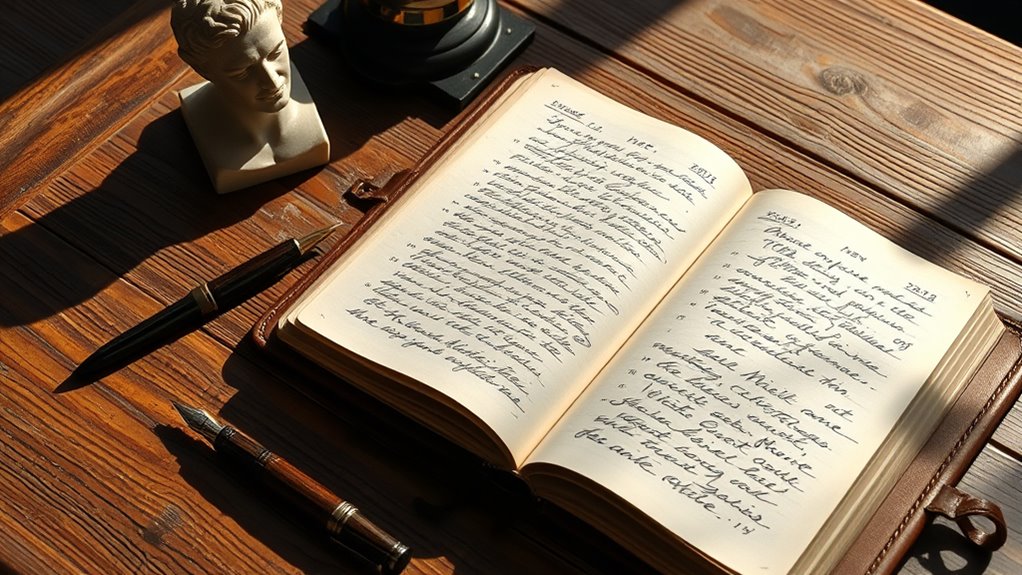
Themes of virtue and self-discipline are central to both Marcus Aurelius’s Meditations and modern practices of personal reflection. You focus on developing qualities like integrity, patience, and humility, endeavoring to become a better person.
Marcus emphasizes controlling your passions and acting in accordance with nature and reason. Similarly, modern journaling encourages you to identify your values, set intentions, and hold yourself accountable.
Both approaches highlight self-awareness as a foundation for growth. You learn to recognize your flaws and actively work to improve them, fostering inner strength.
Self-awareness fosters growth, empowering you to recognize flaws and cultivate inner strength.
Whether through Stoic philosophy or contemporary reflection, the goal remains the same: cultivate virtue and discipline to lead a meaningful, resilient life. This shared focus guides your journey toward personal excellence.
Approaches to Dealing With Adversity
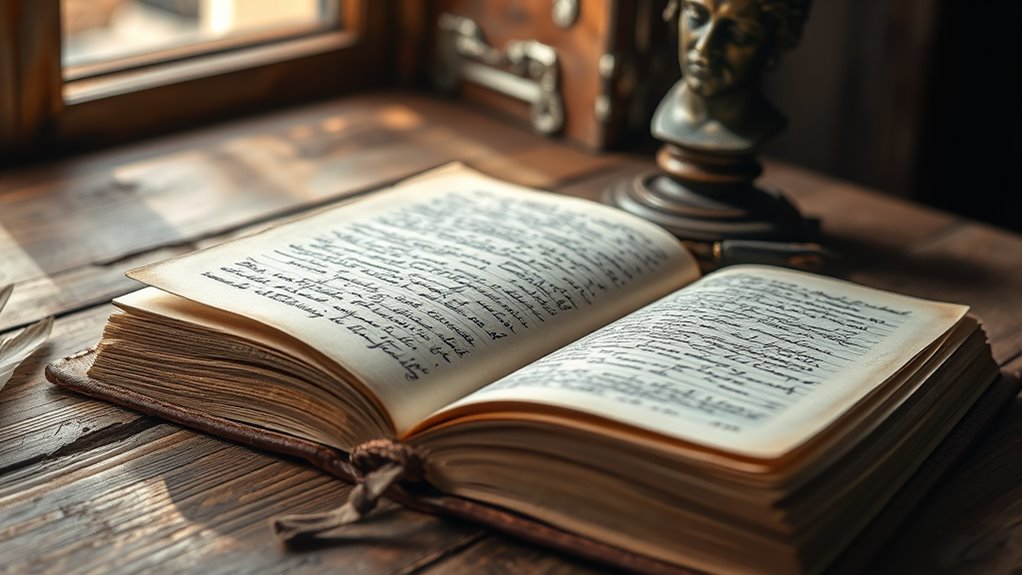
When faced with adversity, both Marcus Aurelius’s Meditations and modern journaling offer practical strategies to navigate challenges. You might:
- Reflect on your control over the situation and accept what you can’t change.
- Write about your feelings to acknowledge and process them honestly.
- Reframe setbacks as opportunities for growth and learning, utilizing techniques like mental barriers removal to clear your mind. Recognizing the importance of self-awareness can deepen your understanding of your reactions and promote emotional resilience.
- Recall past victories to build confidence and resilience.
- Incorporate techniques like exfoliation to remove mental barriers and refresh your perspective. Recognizing the role of attention in these practices can deepen your self-awareness and enhance your ability to stay focused amidst difficulties.
Additionally, understanding how financial aspects influence decision-making can provide clarity during challenging times, helping you maintain perspective and prioritize effectively. These approaches help you develop a calm, rational mindset and foster emotional resilience. Marcus emphasizes self-awareness and acceptance, while modern journaling encourages active reflection and reframing.
Both methods aim to transform adversity into an opportunity for personal growth, empowering you to face difficulties with clarity and strength.
The Role of Audience and Privacy in Journaling
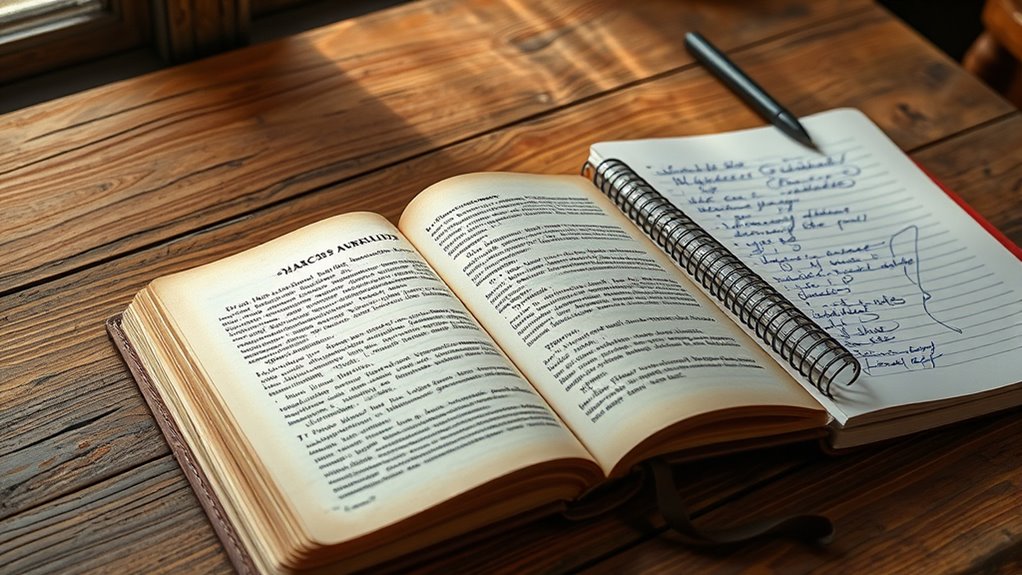
The level of privacy in your journaling considerably influences how openly you express your thoughts and feelings. When you keep your journal private, you’re freer to explore deep emotions and honest reflections without fear of judgment. Conversely, if others have access, you might hold back or tailor your entries. Consider this table:
| Audience | Privacy Level | Writing Style |
|---|---|---|
| No one sees it | High | Candid, raw, unfiltered |
| Trusted few | Moderate | Honest but mindful |
| Public or shared | Low | Polished, cautious |
| Personal journal | High | Authentic, vulnerable |
| External readers | Low | Superficial, restrained |
Your choices shape your journaling experience—either as a private sanctuary or a tool for external sharing. Engaging in mindfulness practices can further deepen your self-awareness and enhance the authenticity of your journaling. Additionally, understanding the safety features of your journaling environment can help you feel more secure when revealing your innermost thoughts. For example, using password protection or encrypted digital journals can provide extra security. Being aware of the horsepower of electric dirt bikes can also inform your choices if you’re considering outdoor activities that involve physical effort and energy management.
Modern Tools and Techniques for Self-Exploration
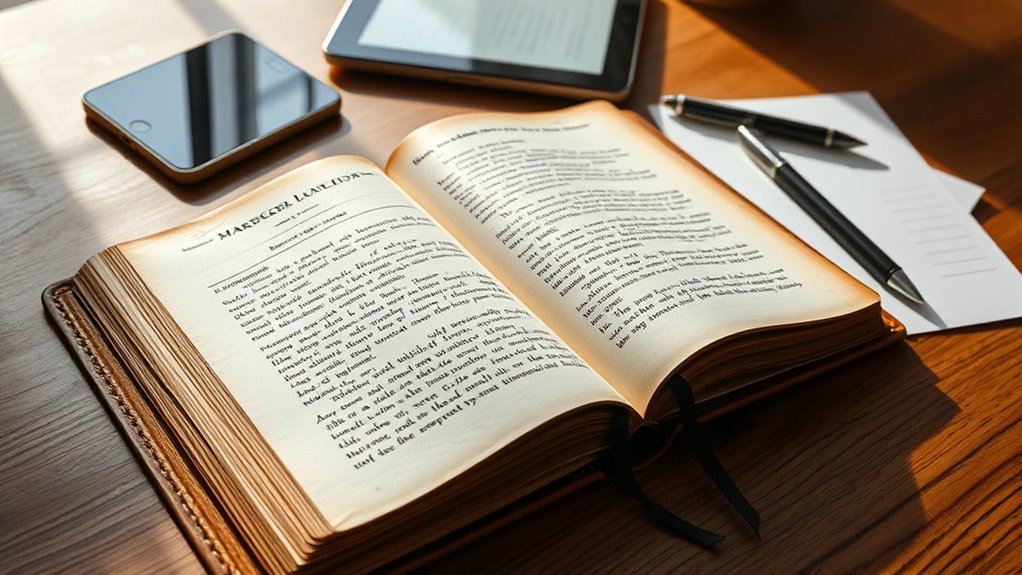
Modern tools and techniques have revolutionized self-exploration, making it easier than ever to gain insight into your thoughts and emotions. You can now track your mood daily, analyze patterns, and reflect on your growth with digital apps. Incorporating well-being tips such as mindfulness meditation and mood journaling can further enhance your understanding of yourself and promote emotional resilience. Picture yourself:
- Using a mood journal app that visualizes fluctuations over weeks.
- Recording voice memos, capturing raw feelings in real-time.
- Engaging in guided meditation sessions to foster mindfulness.
- Participating in online communities for feedback and shared experiences.
Additionally, exploring anti-aging effects through targeted practices like eye patches can support your overall self-care routine, helping you feel more refreshed and confident. These methods create an immersive experience, turning self-reflection into an active, dynamic process. Instead of pen and paper alone, you leverage technology to deepen your understanding and develop new perspectives.
This blend of tradition and innovation empowers you to explore your inner world more thoroughly.
Frequently Asked Questions
How Did Marcus Aurelius’ Stoic Beliefs Influence His Personal Reflections?
Your question explores how Marcus Aurelius’ Stoic beliefs shaped his personal reflections. His philosophy emphasizes self-control, virtue, and acceptance of fate, which you can see clearly in his writings.
He constantly reminds himself to stay rational, face challenges calmly, and focus on inner peace. These beliefs guide his daily thoughts, helping him maintain perspective and resilience amid the pressures of leadership, making his reflections deeply rooted in Stoic principles.
What Are the Key Differences Between Ancient and Modern Journaling Formats?
Imagine flipping through a delicate, handwritten book versus tapping out notes on a sleek device. Ancient journals often have a reflective, philosophical tone, with handwritten entries focused on virtues and self-awareness.
Modern journals tend to be more structured, digital, and goal-oriented, emphasizing productivity and organization. You notice the shift from personal musings to efficient recording, yet both serve as tools for self-discovery and growth, just shaped by their unique eras.
Can Meditation Practices Enhance Self-Awareness in Both Historical and Modern Contexts?
You can enhance your self-awareness through meditation practices, whether in historical or modern contexts. Meditation helps you focus inward, observe your thoughts, and understand your emotions better.
It cultivates mindfulness, allowing you to reflect on your actions and beliefs. By making meditation a regular habit, you develop a deeper sense of self-awareness, which can lead to greater clarity, emotional resilience, and personal growth in your daily life.
How Do Cultural Values Shape Journaling Habits Across Eras?
Your cultural values shape your journaling habits profoundly, like a master sculptor molds marble. In different eras, you might write to reflect societal ideals, personal growth, or spiritual beliefs.
Today, you often journal for mental clarity or emotional release, influenced by modern values of self-improvement. Across time, these habits reveal what each society treasures—be it honor, self-awareness, or individual expression—guiding how you document your inner world.
What Future Trends Might Emerge in Personal Reflection and Journaling?
You might see future journaling trends becoming more digital, personalized, and interactive. As technology advances, you’ll likely use apps that incorporate multimedia, AI insights, and real-time feedback.
Expect a shift toward more intentional reflection, integrating mindfulness and mental health tools. You’ll probably experiment with new formats, like voice memos or augmented reality, making personal reflection more engaging, accessible, and suited to your evolving lifestyle and technological landscape.
Conclusion
You might think journaling is just a modern trend, but Marcus Aurelius shows us that deep self-reflection has timeless value. His meditations prove that honest, private thoughts can build resilience and virtue—no fancy tools needed. So, don’t dismiss journaling as outdated; it’s your secret weapon for growth. Embrace these practices today, and you’ll find clarity and strength, just like the Stoic emperor. After all, your inner world deserves your attention.
